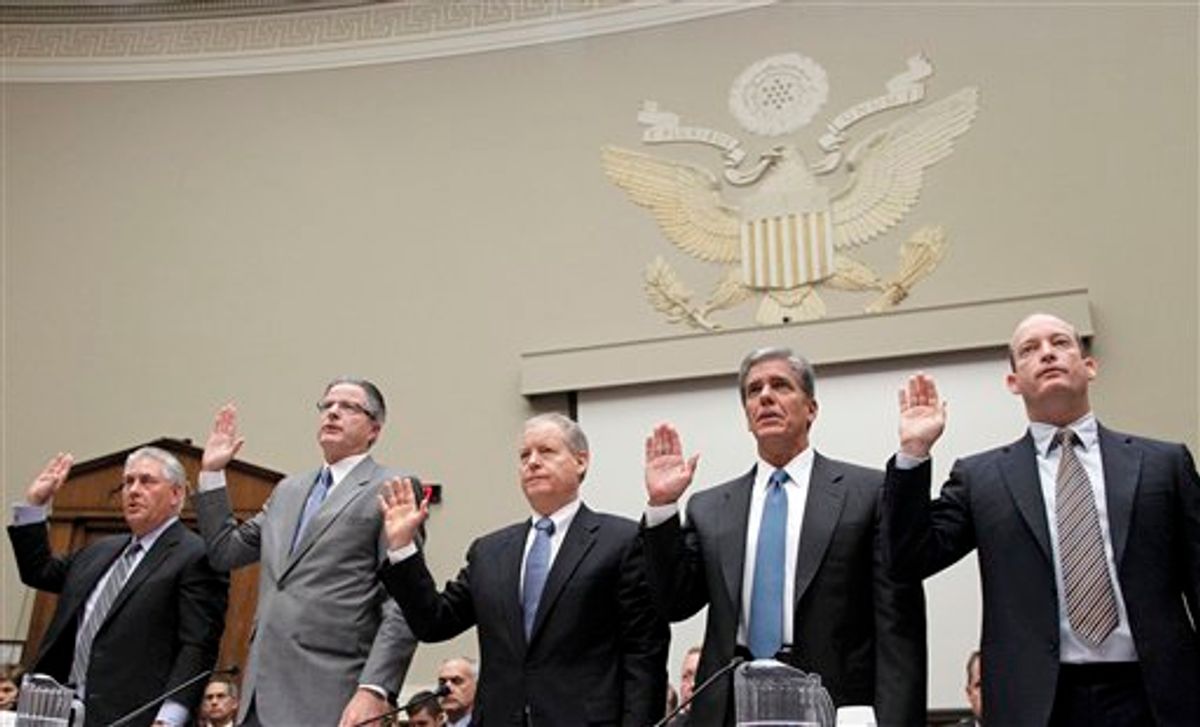In a paradigmatic piece of political theater, Senate Democrats Thursday cast themselves as the goodies standing up to executives of the nation's five biggest, baddest oil companies at a Finance Committee hearing. As you might expect, the executives hit back against proposals to eliminate tax breaks for their industry while the Democrats took the opportunity to grandstand about shared sacrifice and fairness.
Senate Majority Leader Harry Reid has already scheduled a vote for next Wednesday on Democrats' proposal to eliminate tax subsidies for BP, Exxon Mobil, Shell, Chevron and Conoco Phillips, a plan that would reduce the deficit by $21 billion over ten years. This quarter, the oil industry has seen record breaking profits while the prices at the pumps have exploded (owing largely to unrest in the Middle East and demand from growing economies). But Thursday's hearing had little to do with unwarranted oil tax breaks -- it was pure political theater.
First, many Republicans, as well as oil-state Democrats, oppose the proposal, so the chances are pretty slim that it will get the 60 votes needed to avoid a filibuster. And it's hard to see what grilling oil executives might do to change this reality.
In advance of Thursday's hearing, the Finance Committee's Democrats wrote to the oil executives:
"We urge you to take this opportunity to publicly admit that, given your companies' prodigious profits, you no longer need taxpayer subsidies. We hope you will do the right thing for our country's fiscal health and endorse their discontinuation."
But the executives did not do this. Instead, they headed to Capitol Hill and acted exactly like top executives of big oil companies act. They defended their practices and profits. "Don't punish our industry for doing its job well," Chevron Chief Executive John Watson said. Watson added that the "American people don't want shared sacrifice, they want shared prosperity."
More interesting, perhaps, is the Democrats' use of the word "need" in their letter and throughout the hearing. For example, Sen. Ron Wyden (D-Ore.) showed a video of a 2005 hearing in which oil executuves said they did not need incentives to encourage them to drill when oil was above $55 a barrel.
"If your company didn't need incentives to drill for oil at $55 a barrel, how in the world can you possibly need incentives when oil is at $100 a barrel?" Wyden asked.
And Sen. Chuck Schumer (D-NY) said, "You’d have an easier time convincing the American people that a unicorn just flew into this hearing room than that these big oil companies need taxpayer subsides, that's the real fairy tale."
And here is where the senators missed the point, or (more likely) betrayed themselves as showmen completely. Evidently, neither the oil executives nor those the lawmakers that support oil tax breaks will be swayed by an argument from need. Corporate interests famously don't work on a basis of need.
The ranking Republican member of the Finance Committee, Orrin Hatch (R-Utah), called Thursday's hearing a dog and pony show (he even held up large photo of a dog sitting on the back of a pony). In 2010, Hatch received $113,850 in campaign contributions from the oil and gas industry, according to the Center for Responsive Politics. In 2010, the oil and gas industry spent $146.5 million on federal lobbying. That sort of clout in Washington moots the issue of what the oil companies do or do not "need" as relevant, which Schumer, Wyden et al. must know.



Shares